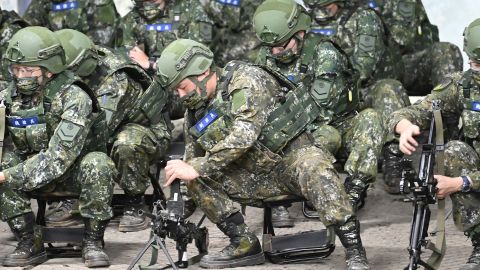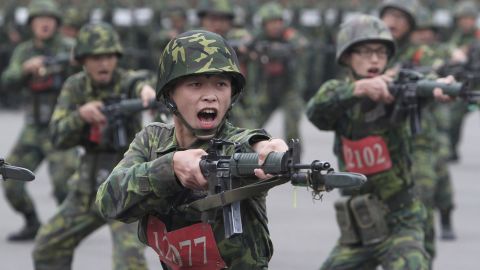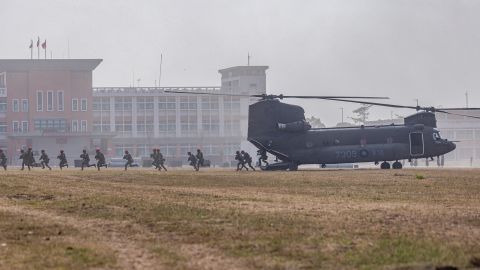Taipei, Taiwan
CNN
—
Rising concerns over increasingly aggressive military maneuvers by China have prompted Taiwan to extend the mandatory military service period most of its young men must serve. But former conscripts interviewed by CNN say Taipei will need to do far more than that if it is to make the training effective.
Outdated, boring and impractical. That was the verdict of six young men who spoke to CNN about their recent experiences of mandatory service in Taiwan’s military.
They describe a process that was designed decades ago with a heavy emphasis on bayonet training, but lacking instruction in urban warfare strategies or modern weapons like drones. Some say there were too few rifles to go around, or that the weapons they trained with were too old to be of use. Others recount “specializing” in cannon, grenade and mortar units, but never receiving any ammunition to train with.
Their criticisms come at a crucial time for Taiwan’s military. President Tsai Ing-wen announced recently that the period of mandatory service for men born in or after 2005 will be extended from four months to a year, saying that the present system “no longer suits the needs” of the island’s defense. The military says the rethink follows comparisons to the militaries of other democratic jurisdictions that have longer conscription periods – such as South Korea (18-21 months), Singapore (24 months) and Israel (24-30 months).
Strengthening the island’s military has become a key concern for Tsai, who has spoken of the need to highlight Taiwan’s determination to defend itself amid increasingly aggressive noises from Beijing. The ruling Chinese Communist Party claims the self-governing democracy of 23.5 million people as part of its territory, despite never having controlled it, and has sent record numbers of air and sea patrols to harass it since former US House Speaker Nancy Pelosi visited in August. Chinese leader Xi Jinping has repeatedly refused to rule out the use of force to “reunify” the island with mainland China.
“No one wants war,” Tsai said in announcing the lengthening of mandatory service periods in December. “This is true of Taiwan’s government and people, and the global community, but peace does not come from the sky, and Taiwan is at the front lines of the expansion of authoritarianism.”
But former conscripts are skeptical, telling CNN the problems with mandatory military service go beyond the short time frame and will only be fixed by a more thorough revamp.
Tsai herself has acknowledged that many citizens feel serving in the military is “just a waste of time.”
“In our company, we had more than 100 assault rifles, but only slightly more than a dozen could be used for shooting practices,” said Frank Liu, a 26-year-old auditor from the central Changhua county who served in 2021. He said about 140 conscripts received training in his company.
“A lot of those assault rifles were made many decades ago, and many were too worn out to be used in training. The weapons had to be rotated among ourselves.”
Paul Lee, a factory manager from Taipei who served in 2018, had a similar experience.
“We didn’t fire many rounds during the military training,” Lee said. “I was practicing with the T65 assault rifle, and I only shot about 40 rounds during the entire training period.
“I’m concerned that many people who underwent the training with me won’t even be able to operate a rifle with confidence.”

Under the current rules, the four-month service period is normally divided into two parts: five weeks of basic training, and 11 weeks of ground training at a military base.
During the ground training period, conscripts are often assigned specialties – but even then some say they receive only the most cursory of insights.
Dennis, a 25-year-old engineer from Taichung city who served last year, said while he was assigned to specialize in cannons, he never learned how to fire them because trainers were worried the recruits might get hurt. He asked only to be identified by his first name because he remains a reservist.
“We were assigned simple tasks, and we spent most of the time helping with cleaning and washing the cannon carts,” he said. “If war breaks out today and I am told to work as an artilleryman, I think I will just become cannon fodder.”
Adam Yu, a 27-year-old designer from the northern Keelung city who served in 2018 and specialized in mortars and grenade launchers, said while he had been shown how to prepare the weapons, he had never been given any ammunition or practiced firing them.
“I’m not sure if I can even operate those weapons,” said Yu, adding, “I still don’t know how those weapons are supposed to be used in the battlefield.”
That sentiment was echoed by another former conscript surnamed Liu. The 28-year-old salesman specialized in data processing with the air force and received training in the southern Pingtung county in 2015. He too asked for his first name to be withheld, saying he may still be called upon for additional reservist training.
“Our commanders barely taught anything during our ground training, because they felt we would only be here for a few months and it wouldn’t make much of a difference for them,” he said.

Taiwan has a professional volunteer military force that as of last year was made up of 162,000 full-time troops, according to a report by the Legislative Yuan. On top of this, an estimated 70,000 men complete a period of mandatory military service every year.
Conscripts must undergo a period of physical training and are taught to shoot rifles and use bayonets.
Several of those who spoke to CNN questioned the amount of time spent on bayonet training, arguing it was outdated, although some militaries continue to teach it in recruitment training programs.
“I think bayonet training was just a waste of time, because I really couldn’t think how we could put that into practice,” Frank Liu said.
“Just look at the Russia-Ukraine war, there are so many types of weapons used. When does a soldier ever have to resort to a bayonet to attack their enemy? I think that was really outdated.”
Yu, from Keelung, said his commanders had put huge emphasis on bayonet training because it made up part of the end-of-term examination.
“We were ordered to memorize a series of slogans,” he said. “When we were practicing bayonet, we were required to follow the instructions of the squad leader with a specific chant for each movement, and we had to repeat it in the exam.”
Some of these criticisms were acknowledged, tacitly or otherwise, when Tsai announced the lengthening of the conscription period and in the subsequent news briefing by the Defense Ministry in early January.
The ministry said that when the new policy begins in 2024, all conscripts will shoot at least 800 rounds during their service, and they will be trained with new weapons such as anti-tank missiles and drones. Bayonet training will be modified to include other forms of close combat training, it added, and conscripts may also participate in joint military drills with professional soldiers. Meanwhile, basic training will rise from five to eight weeks.
Su Tzu-yun, a director of Taiwan’s Institute for National Defense and Security Research, which is funded by the government, said he is confident the reform will boost the island’s combat capabilities.
He also thinks there is value in keeping bayonet training in the curriculum.
“It helps boost a soldier’s courage and aggressiveness,” he said. “If soldiers engage in a mission that is not suitable for firing weapons, they may also use bayonet as an alternative option.”

Su added that while modern weapons will be included in the new training curriculum, it would be impractical for every soldier to practice firing them because this would simply be too costly.
“In the US, the training of Javelin [anti-tank missiles] is conducted through simulation, because each missile costs $70,000 and it is not possible for everyone to fire them,” he said. “Usually, the whole unit finishes the simulation, then the commander will pick a few soldiers to practice firing it.”
Taiwan’s Defense Ministry said in a statement to CNN that it has invited experts to numerous academic seminars on reforming the conscription system, and that it accepted many of their suggestions to boost training intensity.
Even so, not everyone’s convinced.
“I don’t think the lengthening of service alone will lead to better national defense,” said Lin Ying-yu, an assistant professor at Tamkang University’s Institute of International Affairs and Strategic Studies.
He said the “more important questions” involved clarifying in detail the type of training new conscripts would receive.
And on this point, the former conscripts who spoke to CNN remain skeptical.
“When I saw they wanted to add drones to the training, my question was – are we going to have one drone per person and multiple chances to practice flying it?” Yu said.
“If they stick to their old way of teaching, they will just tell us to follow their instructions and memorize its weight and flight distance, and we will not be able to operate it.”
The fear for conscripts is that the new form of mandatory service might end up looking pretty much like the old form, only longer.
“During my service, most of the time we were just asked to perform tedious tasks like moving weapons around to show our commanders, and we spent a lot of time waiting,” said Dennis, the engineer.
It remains to be seen if conscripts’ time will be spent more fruitfully when the new rules come in next year, but all sides agree the stakes are high.
“Active citizens are the foundation and the bedrock of our will to resist,” said Enoch Wu, founder of the civil defense think tank Forward Alliance and a member of Taiwan’s ruling Democratic Progressive Party.
“If the public decides our home is not worth fighting for – or that we don’t stand a chance – then you can have the most professional military and it will still be too little too late.”